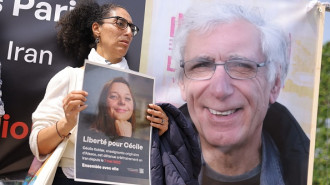Israel Knesset pushes through laws to boost Netanyahu's far-right allies
Israel's parliament is pushing through a series of laws to bolster far-right rule in the country, ahead of former Prime Minister Benjamin Netanyahu's return to power, local media has reported.
Preliminary readings of draft laws have passed in the Knesset including an amendment to Israel's basic law that will allow the appointment of Shas leader Arye Dery as a minister, despite a previous conviction.
Other bills will extend the powers of far-right Religious Zionism leaders Itamar Ben-Gvir and Bezalel Smotrich extensive powers over Palestinians.
If passed, Israel's police chief will serve under Ben-Gvir, when appointed national security minister, and Smotrich given the Civil Administration post in his expected ministerial position in the defence ministry.
The Civil Administration authority has far-reaching powers in the occupied West Bank. including over Palestinians in Area C and illegal settlers.
Smotrich and Ben-Gvir both live in illegal settlements in the occupied West Bank.
The bills have been condemned by Israel's current centre and right-wing administration, which has sent out a series of alarming statements about the incoming far-right government.
"[The law] is clearly a personal legislation, [which] looks less like a constitutional change and much more like a robbery in broad daylight... [it] will be the springboard for additional personal laws in the future," said outgoing Justice Minister Gideon Saar about a bill exempting suspended sentences and thus paving the way for Dery to be given a government post.
Yariv Levin of Netanyahu's Likud Party was also elected as Knesset speaker.
The law making the police commissioner subordinate to Ben-Gvir as national security minister has been slammed by MKs, a politician who in 2007 was convicted of inciting hatred for holding a placard reading "expel the Arab enemy".
"In normal circumstances, if there was a contest for the person least suitable to be public security minister, you would undoubtedly take first place, by far," Yesh Atid lawmaker Yoav Segalovitz told Ben-Gvir in parliament.
"You would have never been appointed [public security minister] if we didn't have such a weak prime minister [Netanyahu] who was afraid of being photographed with you until a month ago, and now would likely hang a picture of you in his office just as you had a picture of Baruch Goldstein."
Goldstein was an American-Israeli mass murderer who shot dead 29 Palestinians at a mosque in Hebron and supporter of the banned Kach party, which Ben-Gvir supported.
Israel police's former commissioner, Roni Alsheikh, has warned that Ben-Gvir's appointment to the security post will lead to militias forming and anarchy.
"When the law enforcement system is subject to external political interference, then my trust and that of many of the citizens of the State of Israel will drop dramatically, and when it drops - we will encounter anarchy," Alsheikh said in an interview with Yediot Ahronot.
Secular Israelis have voiced concern about the next government establishing "Talmudic law" in Israel with Likud finalising details on a coalition deal with United Torah Judaism and other far-right parties that include demands on not generating electricity on the Sabbath and other religious laws.
There are fears of terrifying assaults on Palestinians in the West Bank, Gaza and Israel once the far-right is in power.
Analysts have also highlighted the terrifying shift in the already suffocating status quo that will take place once Ben-Gvir and Smotrich are handed far-reaching powers in the occupied territories.
"Internally, the new role is already facing pushback from Israeli politicians. Outgoing Defence Minister Benny Gantz accused Netanyahu of giving Ben-Gvir "a private army" in the West Bank," wrote Jessica Buxbaum for The New Arab.
"Having control over the Border Police means Ben-Gvir will be in charge of law enforcement handling Palestinian protests and Israeli settlement outposts in the West Bank."





 Follow the Middle East's top stories in English at The New Arab on Google News
Follow the Middle East's top stories in English at The New Arab on Google News

![The law could be enforced against teachers without prior notice [Getty]](/sites/default/files/styles/image_330x185/public/2178740715.jpeg?h=a5f2f23a&itok=xMdFOAIF)
